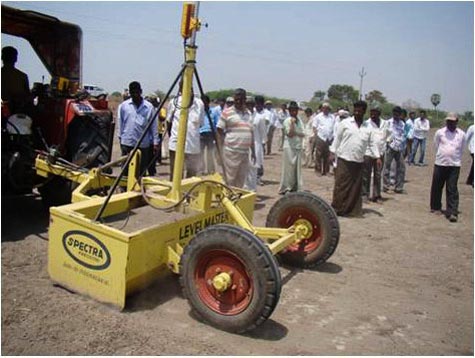Farmers in the Upper Krishna Project (UKP) command area of Karnataka State in southwestern India traditionally grow two crops of rice each year, but recent water shortages have seriously cut into harvests and farm profits for the winter crop. As part of the Cereal Systems Initiative for South Asia (CSISA) satellite hub in Karnataka, the University of Agricultural Sciences-Raichur (UAS), in collaboration with CIMMYT, the International Rice Research Institute (IRRI), and other public and private sector partners, have begun testing and promoting winter maize sown using zero tillage as an alternative. Coverage the first year (2011) reached 1,200 hectares and the practice has caught the attention of farmers, as well as several research and development organizations.
On 18 March 2012, the UAS, CIMMYT, and IRRI, together with the company Ganga-Kavery Seeds and the Directorate of Maize Research of the Indian Council of Agricultural Research (ICAR), organized a multi-stakeholder consultation on cropping diversification through the promotion of zero-till maize in fields at Devapur Cross, Bairamaddi Village Clusters, Shahpur Block, Yadgir District, Karnataka. The event drew more than 200 participants, including 160 farmers from Gulbarga, Koppal, Raichur, and Yadagir Districts, and 45 scientists and extension agents from various research stations of UAS-Raichur, the State Department of Agriculture, and Ganga-Kaveri Seeds.
 Discussions covered laser leveling, direct-seeded rice, zero-till maize, conservation agriculture machinery, the turbo seeder for residue management, weed management, pest management, cultivar choices, potential diversification options using resource-conserving technologies, and the potential for diversification and the adoption of water-wise practices to make more efficient and productive use of irrigation water. The operation and benefits of conservation agriculture machinery, including the laser land leveler, zero-till multi-crop planter, and turbo seeder, were demonstrated and explained. Farmers who have adopted the technologies shared their views and encouraged others to adopt.
Discussions covered laser leveling, direct-seeded rice, zero-till maize, conservation agriculture machinery, the turbo seeder for residue management, weed management, pest management, cultivar choices, potential diversification options using resource-conserving technologies, and the potential for diversification and the adoption of water-wise practices to make more efficient and productive use of irrigation water. The operation and benefits of conservation agriculture machinery, including the laser land leveler, zero-till multi-crop planter, and turbo seeder, were demonstrated and explained. Farmers who have adopted the technologies shared their views and encouraged others to adopt.
CIMMYT cropping systems agronomist, M.L. Jat, explained the benefits of conservation agriculture for diverse cropping systems and specifically the practices CSISA is promoting in Karnataka. S.G. Patil, director of education at UAS-R and the person in charge of the Karnataka hub, highlighted activities and progress under the project. R. Sai Kumar, director of the Directorate of Maize Research of ICAR-New Delhi, explained the advantages of single-cross maize hybrids and the importance of quality protein maize (QPM) for nutritional security. B.V. Patil, the vice-chancellor of UAS, Raichur, concluded the meeting by highlighting the need to link farmers and scientists for mutual benefit and learning.
Other participants included B.T. Pujari, director of research, and S.N. Hanchinal, director of extension at UAS-Raichur; B.M.Chittapur, dean of agriculture, College of Agriculture, Bheemarayanagudi; T. Satyanarayana, deputy director, IPNI-South India at Hyderabad; Dr Balaraj, assistant director of agriculture, Surapur; M.R. Ravikumar, marketing manager, Ganga Kaveri Seeds Pvt Ltd, Bengaluru; and U.B. Chandrashekhar, distributor in Karnataka for National Agro-Industries, Ludhiana.

